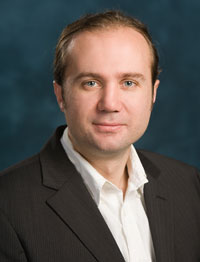 In developing areas of the world, living with HIV/AIDS is a constant struggle with lifestyle-altering consequences. ME Professor Nikos Chronis is researching ways to alleviate these difficulties by developing a biochip that monitors the immune status of HIV-infected populations in resource-limited societies. The biochip uses a microelectromechanical systems (MEMS)-based imaging system to count the number of CD4 cells in HIV patients.
In developing areas of the world, living with HIV/AIDS is a constant struggle with lifestyle-altering consequences. ME Professor Nikos Chronis is researching ways to alleviate these difficulties by developing a biochip that monitors the immune status of HIV-infected populations in resource-limited societies. The biochip uses a microelectromechanical systems (MEMS)-based imaging system to count the number of CD4 cells in HIV patients.
On October 1, Chronis received the National Institute of Health (NIH) Director’s New Innovator’s Award for the proposed biochip. He is one of about 50 investigators in the early stages of their careers to be honored with this year’s award. The purpose of the award is to “support exceptionally creative new investigators who propose highly innovative projects that have the potential for unusually high impact.”
Over 30 million people are affected by HIV/AIDS worldwide; approximately 90% of these individuals live in resource-limited societies in Africa and India. The methods currently being used to monitor CD4 levels require medical personnel and, for most patients, an inconvenient trip into a city for blood tests. “The need for innovative, inexpensive diagnostic instrumentation technology that can be used in resource-limited settings is immediate,” Chronis said.
 Chronis’s proposed method allows patients to perform the blood tests without the aid of doctors or expensive medical equipment. The test can be done at home by obtaining a blood sample from a finger prick, placing the sample on a biochip, and feeding the chip into a machine that uses fluorescent microscopy to calculate the number of CD4 cells. This method is fast, affordable, and more user friendly than the technology being used currently, most notably fluorescence activated cell sorting (FACS).
Chronis’s proposed method allows patients to perform the blood tests without the aid of doctors or expensive medical equipment. The test can be done at home by obtaining a blood sample from a finger prick, placing the sample on a biochip, and feeding the chip into a machine that uses fluorescent microscopy to calculate the number of CD4 cells. This method is fast, affordable, and more user friendly than the technology being used currently, most notably fluorescence activated cell sorting (FACS).
By accepting the award, Chronis is obligated to commit at least 27.5% of his research time to his proposal. He is collaborating on this project with Dr. James Riddell from the UM Hospital and Dr. Michael Savona from the University of Texas. Riddell, an infectious disease doctor, is helping Chronis with the human studies aspect of his research, and Savona is comparing the biochip method with FACS.